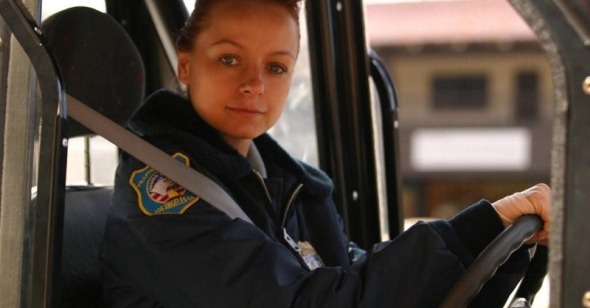Winning Losers
By Leo Goldsmith
Expired
Dir. Cecilia Miniucchi, U.S., Truly Indie
It’s an incontrovertible truth that Samantha Morton is among the best actresses in the world, a fact somehow aided and not obscured by her insistence on playing, from Sweet and Lowdown to Mister Lonely, the same character: the innocent, all-forgiving punching bag of a self-obsessed, self-hating asshole. And in Cecilia Miniucchi's Expired, Morton once again owns this self-abnegation, here in its most socially and municipally abject form: that of the meter maid. Reluctantly writing up parking tickets to the ever irate and incredulous population of Santa Monica, Morton's Claire, in voice over, identifies herself as "one of the most hated people in the world." A brutally funny and relentlessly squirm-inducing film about neuroses, loneliness, and love, Expired posits the traffic cop as the nadir of self-esteem and the constant recipient of abuse and disgust.
"You always live in fear and guilt," notes Claire, whose personal life seems no more fruitful and rewarding than her career. At the end of a day apologetically dispensing parking tickets and sweetly bearing insults, Claire returns home to the apartment she shares with her mother (played with a warm familiarity by the great Teri Garr, working industriously around her quite apparent multiple sclerosis). Decorated with a saccharine taste for competing floral patterns and dollar-store Christmas lights, their apartment is a comfy haven from the outside world, but a lonely one in which the telephone is only ever used to order Chinese food.
But one day, the phone actually rings, and at the other end is Jay, another traffic cop with whom Claire is trying passively to kindle some romance. As Jay, Jason Patric trades his square-jawed, Speed 2 hunkiness for a cop moustache and hare-trigger sarcasm. In every way but occupation, he is the opposite of Claire: testy, sneering, and vindictive, delighting in giving multiple tickets to the same car-owners (with whom he frequently tussles) and relishing their ire and indignation. He claims to hate music, masturbates to online porn (in the movie, twice), and lashes out at the tiniest paranoid inference of a slight, all while occasionally proclaiming, "I'm a nice guy." Embittered by a failed early marriage and an aborted early career in astrophysics, Jay, in Patric's hands, is the object of sidesplitting pathos. Every twitch of his moustache or clench of his jaw forewarns of an outburst of sad and pointless machismo, even in the sickly floral calm of the cozy Barney two-bedroom. “I like kind—I've never had kind,” he tells Claire between digs about her weight or snipes at her sweet demeanor.
Miniucchi's direction of the film's tone is pitch-perfect—a strange, but deft mix of farcical and naturalistic. Her characters are never mere repositories of quirkiness, even when they are at their most over-the-top, and the film feels so oddly true to life (and love) that we're never sure whether Jay and Claire's romance will come off—or if we want it to. Lingering in the background of the film and subtly referenced in the title is the theme of age and of time running out. None of the characters is under thirty-five, and there is a definite sense of an approaching expiry date, a point at which it will simply be too late for the characters to overcome their insecurities, fall in love, and be happy.
Death and regret hang over the film palpably, and Miniucchi's willingness to put her characters through disaster and humiliation while still plainly empathizing with them is what keeps the film surprising and its characters winning, often in spite of themselves. It's easy to laugh at Jay, but it becomes essential to understand him, even if we probably decide we don't like him. And Claire, whose bright-eyed ingenuousness would leave her victim to boors like Jay, could easily remain the object of ridicule herself if the film did not so deftly render her character development. "I tend to think we screw ourselves over," she tells Jay, late in the film, and although this comes as no revelation to her emotionally retarded boyfriend, it nonetheless demonstrates maturation in Morton's character, a plea for self-acceptance, regardless of what the driving public says.
